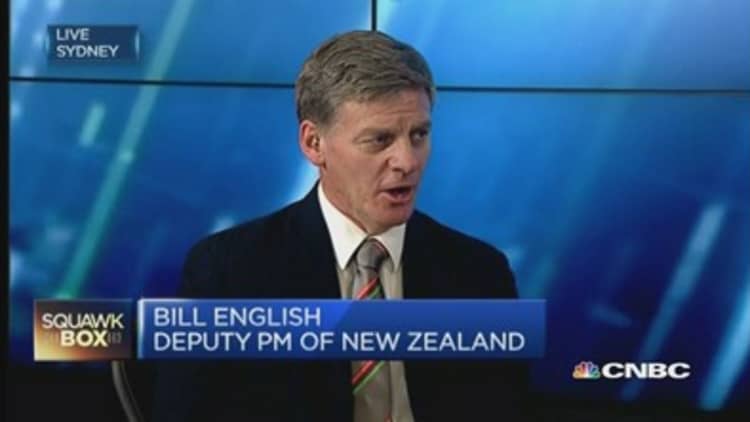Increasing supply is the only way to cool off New Zealand's red-hot housing market, the country's deputy prime minister told CNBC, ignoring the central bank's call for a capital gains tax.
Property markets across New Zealand's major cities are steadily climbing, prompting fears of a sharp correction. Sales volume in March rose to an eight-year high, with median prices in the capital city of Auckland soaring 13 percent on year, nearly double the nation's 8 percent gain, the Real Estate Institute of New Zealand (REINZ) said on Tuesday. New Zealand is one of the few advanced economies that hasn't experienced a major price correction in the past 45 years.
Those statistics prompted an unusually aggressive warning from the Reserve Bank of New Zealand (RBNZ). In a speech on Wednesday, deputy governor Grant Spencer said he "would like to see fresh consideration of possible policy measures to address the tax-preferred status of housing, especially investor related housing." That's a clear reference to a capital gains tax on the sale of investment properties, economists widely agreed.
However, Bill English, deputy prime minister & minister of finance of New Zealand, told CNBC on Thursday that he believes increased housing supply is the best way to fix the issue.
Read MoreNZ Prime Minister:Australia is our top risk
"We just need more houses on the ground faster to deal with the inflows from migration and the positive attitudes of many New Zealand households in a world of lower interest rates," adding that the government is going through a deliberate, long and complicated process to improve supply.
But the RBNZ believes supply-side solutions are unlikely to yield quick results, noting that increased supply will take a number of years to eliminate the housing shortage.

Waiting that long has severe risks, the bank said: "Rising house price inflation, particularly in Auckland, represents a risk to financial and economic stability. The longer excess demand persists, the further prices will depart from their underlying fundamental determinants and the greater the potential for a disruptive correction."
What's behind rising prices?
Auckland's ballooning prices primarily stem from urban planning processes that were designed to densify cities and stop them from growing, English said, which supports his long-term fix of building more houses.
But for the central bank, speculators are the key culprits, which makes taxes the only real solution. "Investors are often setting the marginal market prices that are then applied to the full housing stock within a regional market," Spencer said.
English also highlighted recent data showing more Kiwis are leaving Australia to return home for the first time in over two decades: "We thought it [inflows of New Zealanders] would peak and then drop off but the higher levels of net inflow has been maintained, it's part of the challenge in our housing market, but it's a problem of success and we're happy to have that sort of problem."
Data from Statistics NZ at the end of last year showed 3,200 New Zealand citizens returned home from Australia in the first ten months of 2014 while the number of people leaving New Zealand for Australia was the lowest in a decade
"The outflow of New Zealanders has now reversed and part of that flow back has to do with Australia's mining slowdown, which attracted a lot of qualified and skilled New Zealanders. Now, we've got a lot of construction going on at home - the earthquake recovery, catch-up in Auckland - so there's plenty of opportunity now," he added.
But nothing can be done about higher inflows, the central bank said, noting that policy solutions cannot influence the volume of gross outflows or returning New Zealanders.

